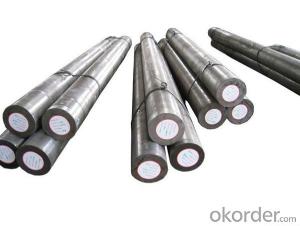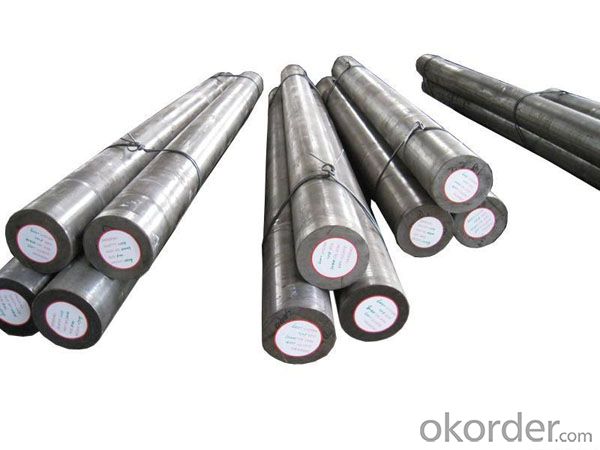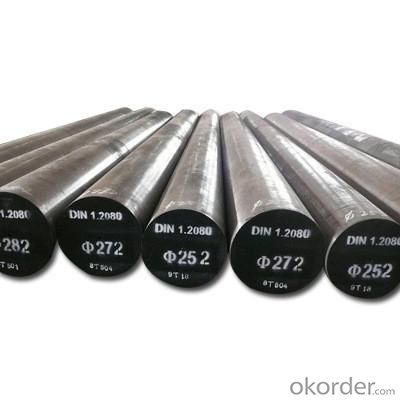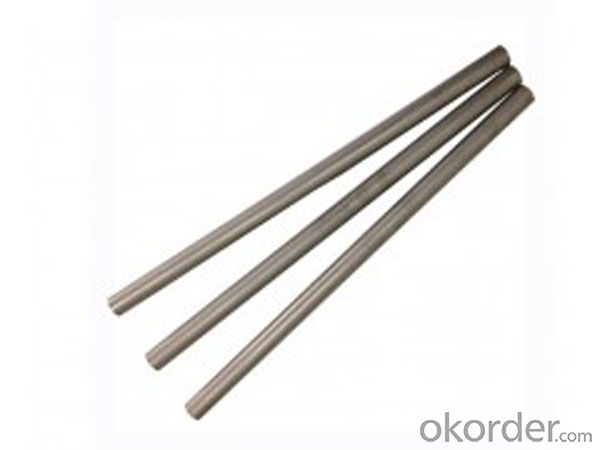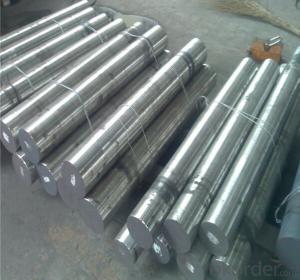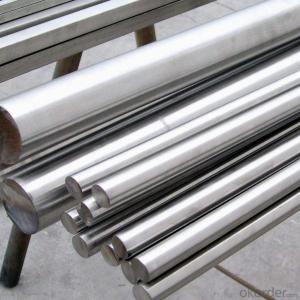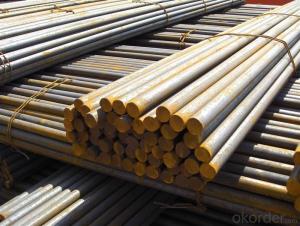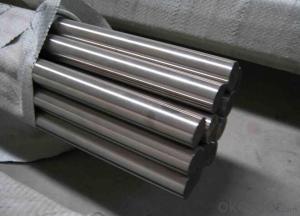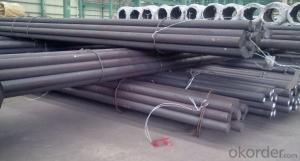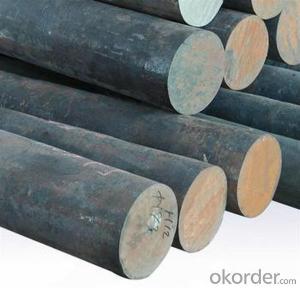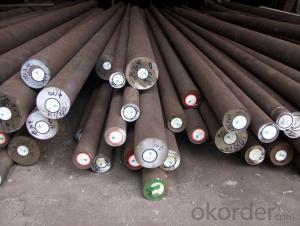Special Steel NAK80 Steel Round Bar Alloy Steel
- Loading Port:
- China main port
- Payment Terms:
- TT OR LC
- Min Order Qty:
- 30 m.t.
- Supply Capability:
- 10000 m.t./month
OKorder Service Pledge
OKorder Financial Service
You Might Also Like
Specification
Special Steel NAK80 Steel Round Bar Alloy Steel
Product Information:
1. Hardness:Hardened hardness: HRC=37~43
2.Size specification
l Thickness: 20~300MM
l Width: 205~2000MM
l Length: 2000~5800MM
l Round bar: 30~350MM
And we can also provide the size as you required.
3. Surface condition: Black surface / Grinding / Polishing / Milling / Machined……
4. shape:flat / round bar / square bar / sheet / plate ……
5. Process: EAF + LF + VD + HOT ROLLED + Heat Treatment (optional)
6. Heat treatment: Normalized / Annealed / Quenched / tempered
7. Technical Data: According to the customer's requirement of Chemical Composition, Physical Properties and Mechanical Testing
8. Inspection: Ultrasonic test according to SEP 1921-84 Gr3, Class C/c or D/d
9. Delivery condition:
l Hot rolled or forging
l Black surface / Grinding / Polishing / Milling / Machined
l Hardened & tempering & annealing
l EAF or ESR material
10. Payment terms:
30% advance by T\T; Balance pay before the shipment against shipping documents or irrevocable LC at sight
11. Delivery time: 3-15 days after advanced payment
12. Material character:
l Low alloy separate out induration steel
l Good mechanical property after the heat-treatment
l High quenching
l The heat-treatment technology is very simple
l Small distortion and nice mirror process under the heat-treatment
l Good nitrogenated capacity, electronic capacity, welding capacity
l Strong good flower pattern engraving capacity and so on
Product Overviews:
| Product Name | Typical Grades | Diameter(mm) | Standard adopted |
| Carbon Steel | 20 (1020/S20C/C22) | Ø16-Ø300 | GB/SAE/JIS/DIN |
| 40 (1040/S40C/C40) | |||
| 45 (1045/S45C/C45) | |||
| Bearing Steel | GCr9 (51100/SUJ1) | Ø12-Ø250 | |
| GCr15 (52100/SUJ2/100Gr6) | |||
| GCr9SiMn (A485-Gr.1/SUJ3) | |||
| Cr-Mo Steel | 20Cr (5120/SCr420H/20Cr4) | Ø12-Ø250 | |
| 40Cr (5140/SCr440/41Cr4) | |||
| 42CrMo(4140/SCM440/42CrMo4) | |||
| Gear Steel | 20CrNiMo | Ø16-Ø600 | |
| 20CrMn(5115/SMnC420/20MnCr5) | |||
| 20CrNiMo(8620/SNCM220/20CrMiMo2) |
Product Show:

Our Advantages:
· Industry experience over 20 years.
· Shipment of goods -More than 70 countries worldwide.
· The most convenient transport and prompt delivery.
· Competitive price with best service.
· High technical production line with top quality products.
· High reputation based on best quality products.
With our experienced, enthusiastic and dynamic staffs, we assure to bring you the products with best quality, reasonable prices and good after-sales services under the motto: Friends First, Business After.
Communication, Experience, Expertise and Best efforts are our Promises to you.
- Q: What are the main characteristics of high-speed steel?
- High-speed steel (HSS) is a type of tool steel that is widely used in machining applications due to its exceptional properties. The main characteristics of high-speed steel include: 1. Superior Hardness: HSS is known for its remarkable hardness, which allows it to withstand high temperatures and resist wear. This hardness is achieved through the addition of various alloying elements like tungsten, molybdenum, cobalt, vanadium, and chromium. 2. Excellent Heat Resistance: High-speed steel has exceptional heat resistance, enabling it to maintain its hardness and strength even at elevated temperatures. This property is crucial in applications where the tool needs to withstand high cutting speeds and generate significant amounts of heat. 3. Good Toughness: HSS possesses good toughness, which means it can resist cracking and chipping under heavy loads or impact. This characteristic ensures that the tool can endure demanding cutting conditions without premature failure. 4. High Wear Resistance: HSS exhibits high wear resistance, making it suitable for cutting, drilling, and milling operations. It can withstand prolonged usage without losing its sharpness or performance, resulting in extended tool life. 5. Versatility: High-speed steel is highly versatile and can be used for a wide range of applications, including cutting, shaping, and forming various materials such as metals, plastics, and wood. Its versatility makes it a popular choice in industries like manufacturing, automotive, aerospace, and construction. 6. Ease of Machining: HSS can be easily machined and shaped into different tool designs, which allows for customization and optimization based on specific applications. This characteristic makes it a preferred material for manufacturing cutting tools like drills, end mills, taps, and saw blades. 7. Cost-Effective: Compared to other high-performance tool materials like carbide, high-speed steel is relatively more cost-effective. It provides a balance between performance and affordability, making it a cost-efficient choice for many machining applications. In conclusion, high-speed steel is valued for its exceptional hardness, heat resistance, toughness, wear resistance, versatility, ease of machining, and cost-effectiveness. These characteristics make it a preferred material for a wide range of cutting tools, ensuring efficient and reliable machining operations.
- Q: How does special steel contribute to the overall economy?
- There are multiple ways in which special steel contributes to the overall economy. To begin with, special steel finds extensive application in industries such as automotive, construction, energy, and machinery, among others. Its distinct properties and characteristics make it the preferred choice for producing high-performance and durable goods. The demand for special steel not only creates employment opportunities in the steel industry and related sectors but also fuels economic growth. Moreover, the production and export of special steel play a vital role in a country's export earnings, thereby enhancing its trade balance and overall economic performance. Several countries, including China, Japan, and Germany, have greatly benefited from the export of special steel products due to their thriving steel industries. Furthermore, the development and advancement of special steel technologies have a positive impact on innovation and research and development (R&D). Companies in the steel industry invest in R&D to enhance the properties and performance of special steel. This not only results in the creation of new and improved steel alloys but also drives innovation in other industries that rely on special steel products. Additionally, special steel plays a crucial role in infrastructure development as it is extensively used in the construction of bridges, buildings, pipelines, and other critical infrastructure projects. By incorporating special steel, these projects gain durability, safety, and longevity, leading to long-term cost savings. Consequently, this contributes to economic development by promoting sustainable and efficient infrastructure. Lastly, special steel also contributes to the overall economy by fostering a competitive manufacturing sector. Countries with a strong special steel industry possess a competitive advantage across various sectors, as they can manufacture high-quality products more efficiently. This attracts investment, stimulates industrial growth, and enhances overall productivity, ultimately leading to national economic prosperity. In conclusion, special steel contributes to the overall economy through its wide-ranging utilization in diverse industries, its impact on export earnings, its influence on innovation and R&D, its contribution to infrastructure development, and its ability to foster a competitive manufacturing sector.
- Q: How does special steel perform in high-pressure and high-temperature environments?
- Special steel performs exceptionally well in high-pressure and high-temperature environments due to its unique composition and properties. It exhibits excellent strength, toughness, and resistance to corrosion, making it ideal for withstanding extreme conditions. Additionally, special steel can maintain its mechanical properties, structural integrity, and dimensional stability even under intense heat and pressure, ensuring reliable performance and longevity in such environments.
- Q: What are the main applications of special steel in the power transmission industry?
- Special steel is widely used in the power transmission industry for various applications. One of the main applications is in the manufacturing of power transmission components such as gears, shafts, and couplings, where special steel's high strength and durability are essential for transmitting power efficiently. Additionally, special steel is also used in the construction of power transmission towers and poles, providing structural integrity and resistance against harsh environmental conditions. Overall, the main applications of special steel in the power transmission industry revolve around its ability to enhance performance, reliability, and longevity of power transmission systems.
- Q: Is special steel suitable for electrical and electronic applications?
- Yes, special steel is suitable for electrical and electronic applications. Special steel is often used in electrical and electronic applications due to its excellent conductivity, high strength, and resistance to corrosion and wear. It is commonly utilized in the manufacturing of electrical connectors, circuit breakers, transformers, and various other components in the electrical and electronic industry.
- Q: How is carbon steel used in the manufacturing of pipes and tubes?
- Carbon steel is commonly used in the manufacturing of pipes and tubes due to its high strength and durability. It provides excellent resistance to corrosion and can withstand extreme temperatures and pressure. Additionally, carbon steel can be easily formed and welded, making it ideal for the fabrication process involved in producing pipes and tubes.
- Q: How does special steel resist thermal fatigue?
- Special steel is able to resist thermal fatigue due to its unique composition and properties. Thermal fatigue occurs when a material is subjected to repeated heating and cooling cycles, leading to the formation of cracks and eventual failure of the material. Special steel is specifically designed to withstand extreme temperature changes. It has a high melting point and excellent thermal conductivity, which allows it to efficiently dissipate heat and minimize thermal stress. Additionally, the steel is often alloyed with elements such as chromium, nickel, and molybdenum, which enhance its resistance to thermal fatigue. The alloying elements in special steel form a protective layer that acts as a barrier against oxidation and corrosion. This protective layer prevents the formation of cracks and improves the steel's ability to withstand thermal cycling. Furthermore, the alloying elements improve the steel's structural integrity by promoting the formation of fine and evenly dispersed microstructures. This enhances the steel's toughness and resistance to cracking. Moreover, special steel undergoes various heat treatment processes to further enhance its resistance to thermal fatigue. These processes involve controlled heating and cooling cycles, which refine the microstructure of the steel and make it more resistant to deformation and cracking. The heat treatment also helps in relieving any residual stresses that may have been induced during the manufacturing process. In summary, special steel resists thermal fatigue through its unique composition, alloying elements, and heat treatment processes. Its high melting point, excellent thermal conductivity, and protective layer against oxidation and corrosion make it highly resistant to thermal cycling. The refined microstructure and relieved residual stresses further enhance its ability to withstand repeated heating and cooling cycles without failure.
- Q: How does special steel contribute to improving product efficiency in energy-intensive processes?
- Special steel plays a crucial role in enhancing product efficiency in energy-intensive processes by offering superior strength, durability, and heat resistance. It allows for the design and construction of lighter, more compact equipment, reducing energy consumption and improving overall efficiency. Additionally, special steel's corrosion resistance properties help extend the lifespan of machinery, minimizing downtime and maintenance costs. Its use in energy-intensive processes enables better performance, optimized resource utilization, and ultimately contributes to a greener and more sustainable industrial landscape.
- Q: How does special steel perform in construction applications?
- Special steel, also known as alloy steel, plays a crucial role in construction applications due to its exceptional properties and performance characteristics. This type of steel is specifically engineered to possess enhanced strength, durability, and resistance to various environmental factors, making it highly suitable for demanding construction projects. One of the key advantages of special steel in construction is its high strength-to-weight ratio. This means that it can withstand heavy loads and pressures while maintaining a relatively low weight, allowing for more efficient and cost-effective designs. Additionally, special steel exhibits excellent fracture toughness, which ensures that structures built with this material can withstand significant impacts and vibrations without failing. Another significant benefit of special steel is its exceptional corrosion resistance. Construction projects often face exposure to harsh weather conditions, chemicals, and moisture, which can lead to rusting and deterioration of traditional steel. However, special steel contains elements such as chromium, nickel, and molybdenum, which provide excellent resistance to corrosion and oxidation, ensuring the longevity and durability of structures. Furthermore, special steel offers excellent weldability, allowing for efficient and secure joining of various components during construction. This enables the fabrication of complex structures while maintaining their integrity and strength. In addition to its mechanical properties, special steel can also provide additional benefits in construction applications. For example, certain types of special steel possess excellent fire resistance, making them ideal for constructing fire-resistant structures or components. Furthermore, some types of special steel offer enhanced electrical conductivity, making them suitable for applications that require efficient transmission of electricity. Overall, special steel's superior strength, durability, corrosion resistance, weldability, and additional properties make it an excellent choice for a wide range of construction applications. From high-rise buildings, bridges, and infrastructure to offshore structures and industrial facilities, special steel ensures the construction of safe, reliable, and long-lasting structures in various challenging environments.
- Q: Can special steel be used in the printing industry?
- Yes, special steel can be used in the printing industry. It is commonly used for manufacturing various printing components such as blades, cylinders, and rollers due to its excellent durability, hardness, and resistance to wear and corrosion. Special steel can enhance the performance and longevity of printing equipment, resulting in higher printing quality and increased productivity.
Send your message to us
Special Steel NAK80 Steel Round Bar Alloy Steel
- Loading Port:
- China main port
- Payment Terms:
- TT OR LC
- Min Order Qty:
- 30 m.t.
- Supply Capability:
- 10000 m.t./month
OKorder Service Pledge
OKorder Financial Service
Similar products
Hot products
Hot Searches
Related keywords
